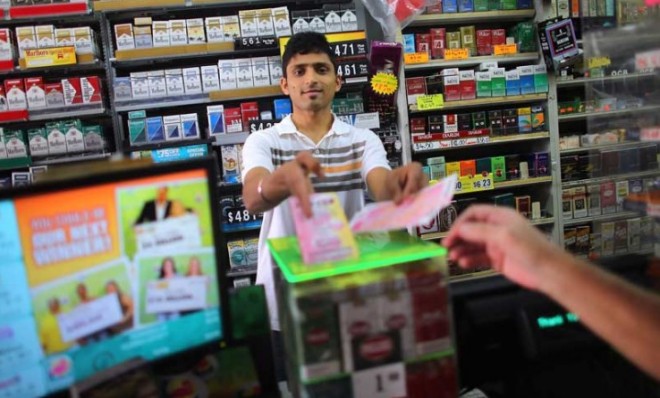How the $500 million Powerball lottery is a tax on the poor
Buying a lottery ticket is a harmless indulgence for most people, but its promise of wild riches can prey on the destitute


A free daily email with the biggest news stories of the day – and the best features from TheWeek.com
You are now subscribed
Your newsletter sign-up was successful
With the Powerball lottery jackpot reaching a record $500 million, people from around the country are flocking to local convenience stores to try their luck. The majority of those standing in line for tickets and joining office pools are likely not habitual lottery devotees, but rather casual players who decided to get in on the fun once the media reported the unprecedented size of the pot. However, the everyday lottery business is a much grimmer affair, relying overwhelmingly on "poverty, habit, and desperation," says Natasha Lennard at Salon:
Studies of lottery ticket sales in North Carolina, South Carolina, California, Texas and Connecticut found that per capita lottery sales are consistently higher in the poorest counties and tickets are more likely to be purchased by unemployed individuals.
Statistics from South Carolina highlight the lottery’s reliance on low earners: people in households earning under $40,000 made up 54 percent of frequent players, while constituting only 28 percent of the state’s population. Meanwhile, a PBS report earlier this year showed that, for America’s very poorest, the lottery is a heavy expenditure: Households that earn at most $13,000 a year spend 9 percent of their money on lottery tickets.
The Week
Escape your echo chamber. Get the facts behind the news, plus analysis from multiple perspectives.

Sign up for The Week's Free Newsletters
From our morning news briefing to a weekly Good News Newsletter, get the best of The Week delivered directly to your inbox.
From our morning news briefing to a weekly Good News Newsletter, get the best of The Week delivered directly to your inbox.
“Lotteries set off a vicious cycle that not only exploits low-income individuals’ desires to escape poverty but also directly prevents them from improving upon their financial situations,” a 2008 study by Carnegie Mellon’s Tepper School of Business noted. The study, aligning with national statistics, found that people who felt poor were found to buy double the number of lottery tickets.
One of the main justifications behind lotteries is that the government — at both the state and federal levels — pockets a portion of the jackpot to finance education programs and the like. Consequently, the lottery has often been compared to a regressive tax, one that costs the poor more proportionately than it does the rich. The obvious counterpoint is that, unlike a tax, the decision to buy a lottery ticket is entirely voluntary — no one is holding a gun to your head. Still, critics say, the lottery is undeniably in large part funded by the poor, who are more susceptible to the jackpot's promise of lavish riches.
A free daily email with the biggest news stories of the day – and the best features from TheWeek.com
Ryu Spaeth is deputy editor at TheWeek.com. Follow him on Twitter.